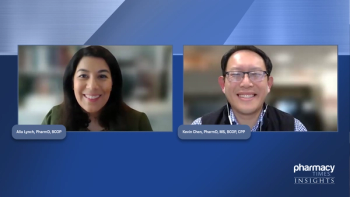
Multidisciplinary Collaboration in cGVHD Care
Panelists discuss how collaboration between pharmacists and health care providers is essential for optimizing treatment outcomes in chronic graft-vs-host disease (cGVHD), emphasizing the importance of education, symptom management, and a multidisciplinary approach to ensure comprehensive, patient-tailored care.
Episodes in this series

Collaboration between pharmacists and other health care providers is crucial for optimizing treatment outcomes in patients with chronic conditions like chronic graft-vs-host disease (GVHD). Education is a key component in this process, as pharmacists play a central role in helping patients and providers understand complex medication regimens and disease manifestations. Pharmacists provide insights into whether certain symptoms are due to medication adverse effects or disease progression. They also set realistic expectations with patients, ensuring they understand the time it takes for therapies to show results and helping to avoid premature discontinuation of treatment. Additionally, pharmacists advocate for symptom management, including the use of topical therapies and other supportive treatments, which can significantly improve a patient's quality of life.
Pharmacists also work with other specialists to ensure comprehensive care, especially when managing adverse effects or complications. This includes ensuring the appropriate use of antimicrobials, monitoring for infection risks, and advising on vaccination schedules, particularly for older patients who may be more vulnerable. A critical aspect of collaborative care is addressing adverse event prevention, which requires ongoing communication between pharmacists, oncologists, and other specialists. This collaborative approach ensures that patients receive the necessary immunosuppressive therapy while managing potential infections or complications. Moreover, pharmacists help to ensure that chronic GVHD treatments are tailored to each patient’s needs, adjusting the therapy as necessary to optimize results.
One promising area for improving care is the introduction of a tumor board–like approach to managing chronic GVHD, where a multidisciplinary team of experts from various fields can collaborate on complex cases. This includes pulmonologists, ophthalmologists, and other specialists who are not always familiar with the nuances of chronic GVHD but can contribute valuable insights to treatment decisions. A team-based approach allows for a more comprehensive management plan that addresses all aspects of the disease, ensuring that patients receive well-rounded, holistic care. By integrating pharmacists into these multidisciplinary discussions, treatment plans can be further optimized, resulting in better patient outcomes.
Newsletter
Stay informed on drug updates, treatment guidelines, and pharmacy practice trends—subscribe to Pharmacy Times for weekly clinical insights.

























